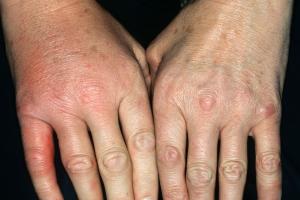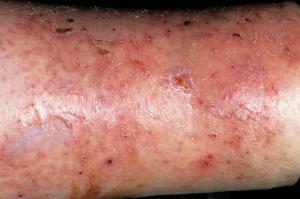Cellulitis
Cellulitis is an infection of the deeper layers of skin and below the skin. It can be serious if not treated quickly. This page contains information on the symptoms and causes of cellulitis and when to get medical advice.
Symptoms of cellulitis
Cellulitis develops suddenly and can spread through the body quickly. Severe infections can spread deep into the body, and can be life threatening.
Cellulitis causes an area of skin to suddenly become:
- red
- hot
- swollen
- painful
- tender

It commonly affects the lower legs, but can occur anywhere.

In more severe cases, cellulitis can also be accompanied by:
- a high temperature (fever) of 38C (100.4F) or above
- vigorous shaking (rigors)
- nausea and vomiting
- dizziness
- confusion
These are signs that the infection has spread deeper into the body.
When to get medical advice
See your GP or go to GP out of hours service as soon as possible if an area of your skin suddenly turns red, painful and hot.
Cellulitis infection can spread in the body into the bloodstream causing sepsis. Sepsis is a potentially life-threatening condition triggered by an infection or injury.
Early treatment can help reduce the risk of the infection becoming severe.
Call 999 for an ambulance or go to your nearest emergency department immediately if:
- your face or the area around your eye is affected
- your symptoms are getting rapidly worse
- you experience other symptoms as well as the changes in your skin, such as a fever or vomiting
- you have a weak immune system – for example, because of HIV or chemotherapy – or severe lymphoedema, a condition that causes swelling in the body's tissues
- a young child or elderly person has possible cellulitis
Treatments for cellulitis
Cellulitis is usually treated with antibiotics.
Many infections can be treated with antibiotic tablets at home.
You'll usually be given a course of tablets to take, and your symptoms should start to improve after a few days.
Make sure you complete the whole course of medicine you've been given, even if you're feeling better.
Contact your GP if your symptoms get worse after a few days or don't improve within a week.
For serious infections, treatment is usually started in hospital. You'll normally be given antibiotics directly into a vein.
Outlook for cellulitis
Cellulitis can usually be treated successfully with antibiotics. Most people make a full recovery.
But there is a risk it could cause potentially serious problems, particularly if it's not treated quickly, such as:
- blood poisoning (septicaemia) – where the bacteria enter the blood
- kidney damage
- leg ulcers
Septicaemia and kidney problems can be life threatening and require immediate treatment in hospital.
Causes of cellulitis
Cellulitis is caused by a bacterial infection.
The bacteria that cause it often live harmlessly on the skin. However, they can lead to an infection if they get into a break in your skin, such as:
- a bruise, cut or graze
- an animal bite or insect bite
- a leg ulcer
- dry, cracked skin – for example, because of eczema or athlete's foot
In most cases the trigger for the infection is unknown.
The infection isn't normally spread from person to person.
Preventing cellulitis
If you've had cellulitis before, you're more likely to get it again.
It's not always possible to prevent it, but the following measures may help reduce your risk:
- use moisturiser if your skin is dry or prone to cracking
- lose weight if you're overweight – being obese can increase your risk of cellulitis
- try to make sure any conditions that can increase your risk of cellulitis – such as eczema, athlete's foot, leg ulcers and lymphoedema – are well managed
- make sure any cuts, grazes or bites are kept clean – wash them under running tap water and cover them with a plaster or dressing
- wash your hands regularly – particularly when treating or touching a wound or skin condition
If you get cellulitis often or severely, your GP may refer you to a skin specialist called a dermatologist, or an infection specialist.
They will discuss the option of taking antibiotics on a long-term basis to protect against further infections.
Cellulitis and cellulite
Cellulite is a cosmetic problem caused by fatty deposits that form underneath the skin. It is not related to cellulitis.
More useful links
The information on this page has been adapted from original content from the NHS website.
For further information see terms and conditions.